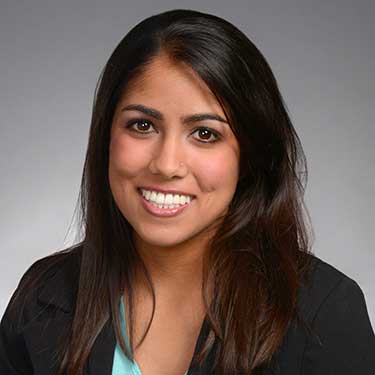Projects like this are made possible by generous contributions from our donors. Support the future of chest medicine by making a gift to CHEST.
 As the inaugural mentee for the Association of Pulmonary and Critical Care Medicine Program Directors (APCCMPD) and CHEST Medical Educator Scholar Diversity Fellowship, Esha Kapania, MD, set her focus on supporting pediatric patients with pulmonary conditions into adulthood. But as she moved through the program, she saw another group of people who needed support—her fellow trainees.
As the inaugural mentee for the Association of Pulmonary and Critical Care Medicine Program Directors (APCCMPD) and CHEST Medical Educator Scholar Diversity Fellowship, Esha Kapania, MD, set her focus on supporting pediatric patients with pulmonary conditions into adulthood. But as she moved through the program, she saw another group of people who needed support—her fellow trainees.
“During my time in training, I found that the structure of our current education system often emphasizes the deficiencies of trainees, without placing equal importance on empowering them to overcome these challenges,” said Dr. Kapania, who was a first-year pulmonary and critical care medicine (PCCM) fellow at the University of Louisville in Kentucky when she was awarded the unique scholarship.
Designed to pair a fellow-in-training with an established medical educator, CHEST and APCCMPD last year launched the Medical Educator Diversity Fellowship to improve diversity in pulmonary and critical care medical education.
The program focuses on creating opportunities for fellows at institutions with limited resources to train them in teaching, curriculum development, and medical education research by giving them access to mentorship at institutions with those resources to foster their development.
Redefining how fellows are supported
Through interactions with her colleagues in training, Dr. Kapania found that in many cases, standardized tests seemed to be the sole benchmarks for success—for both learners and their educators. “This narrow focus not only oversimplifies the concept of competence but also reinforces a dichotomy between so-called ‘strong fellows’ and those labeled as ‘struggling,’” she said.
Over time, Dr. Kapania added, the widening gap of success can lead to demoralization in learners who might otherwise thrive with the right support.
So she stepped in. With the guidance of her mentor, Başak Çoruh, MD, FCCP, Dr. Kapania assembled a diverse team of senior educators to design a study investigating how program directors identify and support struggling fellows—and where the gaps lie in remediation processes.
They used focus groups to interview PCCM program directors representing programs of diverse sizes and structures—community-based, military-based, university-based, and more. In addition to gathering demographic information, they drilled down to more targeted issues. For example, they asked whether program directors had graduated fellows when they worried about fellows’ ability to function independently.
The focus group questions were designed to identify areas of struggle, such as clinical reasoning, medical knowledge, or professionalism. Program directors were encouraged to be specific about how they defined struggling performance in these areas and to take a hard look at their own perceptions of a fellow’s deficiencies.
They were also encouraged to examine challenges in identifying and supporting a fellow who is struggling. For example, if a program director cited “time” as a barrier to support, focus group leaders probed for specifics—did they mean a fellow’s time spent on rotation or in the program, or faculty/program leadership’s time to provide feedback?
The guided groups took notes on wins as well. Participants were asked to discuss a time when a struggling fellow was successfully coached or informally remediated, which interventions were helpful, and what resources they needed to make it happen.
“I knew that with this project, I wanted to focus on improving both the process of identifying learners who are having difficulties and the way we pave a path forward for them,” Dr. Kapania explained. “One that is constructive, individualized, and grounded in growth, rather than judgment.”
This study may be the first to explore remediation practices in PCCM, said Dr. Çoruh, who added that it’s been a joy to serve as Dr. Kapania’s mentor and celebrate her many successes throughout the year—including her selection as Chief Fellow.
“Dr. Kapania has quickly established herself as an integral member of the PCCM educator community,” said Dr. Çoruh, a professor of pulmonary, critical care, and sleep medicine at the University of Washington, where she was formerly program director of the Pulmonary and Critical Care Medicine fellowship program.
“Even though we live and work on different sides of the country, it's been easy for me to virtually drop in to observe Dr. Kapania’s teaching sessions and for us to meet up at our specialty conferences,” Dr. Çoruh said. “She has delivered several local talks and engaged in complementary work, and she plans to share the findings of her scholarly project in the coming months.”
Carrying the mission forward
With her fellowship wrapped up, Dr. Kapania plans to continue pursuing a path in academic medicine. “Clinically, I hope to focus on caring for pediatric patients with pulmonary pathology transitioning into adult care, with the goal of easing that transition and improving continuity of care,” she said.
“In parallel, I’m deeply committed to continuing my work in medical education,” Dr. Kapania added. “I aim to contribute to a culture that prioritizes growth, individualized support, and long-term success for all learners.”